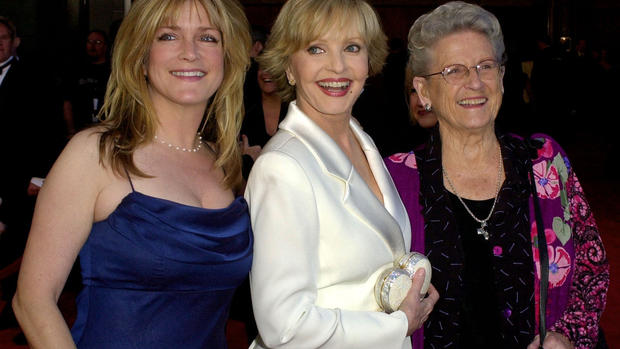Today's TV moms get real
Donna Reed played the perfect mom in the 1960s TV show that bore her name -- a show that could have been titled "Mother Knows Best." So how do today's TV moms compare? Conor Knighton takes a look:
On the sitcom "Mom," Allison Janney plays Bonnie Plunkett, a recovering addict trying to reconnect with her daughter. Last year, she won an Emmy for the role, even though the character isn't exactly a role model:
Christy (Anna Faris): "Mom, I've watched you lick cocaine crumbs out of a shag carpet."
Bonnie (Allison Janney): "It's not a sin to be thrifty, dear."
"Nobody ever comes up and says, 'I wish Bonnie was my mother,'" Janney told Knighton. "Not the greatest mom. Probably the anti-mom."
Bonnie can be crass and selfish. She struggles with her relationships and her sobriety.
"She's very human," said Janney. "She's very flawed. She's very unapologetic."
And very funny.
Christy: "While other mothers were cooking dinner, you were cooking meth."
Bonnie: "Otherwise known as working."
"Mom" is a sitcom, after all, and Bonnie's anti-mom status is played for laughs.
"She's no June Cleaver, let's just say that," Janney noted.
More than 50 years after "Leave It to Beaver" went off the air, June Cleaver is still held up as the iconic sitcom mom.
"These kind of very chipper, very loving, never distracted, most of them didn't work outside the home, just these very cheerful, apron-wearing moms," said Mary McNamara, the Pultizer Prize-winning TV critic for the Los Angeles Times. "Those were the moms from the '50s. So was it reflective of the times? No. Women's lives have always been incredibly diverse. Women have always worked. And the woman who was able to just sort of hang out in pearls and heels waiting for her husband to come home, that was a rarity in reality."
But reality wasn't really the goal back then. This was the same era that brought us "My Mother the Car."
Eventually, TV began to allow for more complicated family dynamics. "The Brady Bunch" featured a blended family.
Oscar-winning actress Shirley Jones turned down "The Brady Bunch": "Because I didn't want to be the mom taking the roast out of the oven."
Instead, Jones became the widowed, working mom on "The Partridge Family."
"Every other show had a little family staying home, raising their kids, going to school, coming home from school, doing their homework. And this was a whole new look at family. I thought it was something that should be seen," she said.
"I was not known as the perfect mother, 'cause I was a working mother and singing in the band and everything," said Jones. "But every mother on television then was the perfect mother. All the series, a perfect family."
In the late '70s and '80s, TV moms were beginning to look more diverse -- from divorced moms "Kate & Allie" to working mom Clair Huxtable.
Kngihton asked, "Do you think that there was a specific show or character that was a turning point in the way that moms were portrayed on TV?"
McNamara said, "Well, I think you would have to look at 'Roseanne.' That was a huge deal. She was angry. She was not beautiful. Her house was a mess. She didn't take any crap."
"But 'Roseanne' was a real revelation, because as we got to know her, there was wisdom there, and there was love there. And I think a lot of Americans really connected with her. Because that was more like their mom or their family or their house than what they had been seeing previously."
"Roseanne" laid the groundwork for some of today's characters, like Clare Dunphy on "Modern Family," and Frankie Heck on "The Middle" -- frazzled moms who make mistakes and are just trying to keep it all together.
And then there's Marge Simpson. She's been the glue holding the Simpson family together for 28 years.
In many ways, Marge is a throwback to the '60s. She vacuums in pearls!
Of course, "Mad Men"'s Betty Draper lives in the 1960s, but she's certainly not like the TV moms of the era. Betty could be mean, petty and selfish (just like some REAL mothers).
"Probably the biggest change is that we're allowed to see more broken women on television," said McNamara. "We went through an era where we had a lot of anti-heroes, broken men. And we still felt very ambivalent about women in similar situations, because women still had to be likable."
There's not much likable about "Game of Thrones"' power-hungry Cerci Lannister. "Nurse Jackie" is an addict whose kids get taken away from her.
"We don't expect women to be angry or violent or alcoholic, even though real women are often all of these things," said McNamara. "And that doesn't mean that they are irredeemable people or characters."
Characters like "Empire"'s Cookie Lyon, and "Breaking Bad"'s Skyler White. From the lesbian moms on "The Fosters," to reluctant mom Carrie Mathieson on "Homeland," the moms on screen today reflect a much wider range of experiences.
Sure, you might not want some of these moms to watch YOUR kids, but you can watch them deal with their own in a way that's no longer so black-and-white.
"Women must have felt really bad that they weren't June Cleaver," laughed Janney. "Like, 'Oh my God, June, I don't do that.' Like, she must have made every mother feel terrible.
"I think I make moms feel great!"
For more info:
- "Mom" (cbs.com)
- "The Partridge Family" on Amazon and iTunes
- Mary McNamara of the Los Angeles Times
